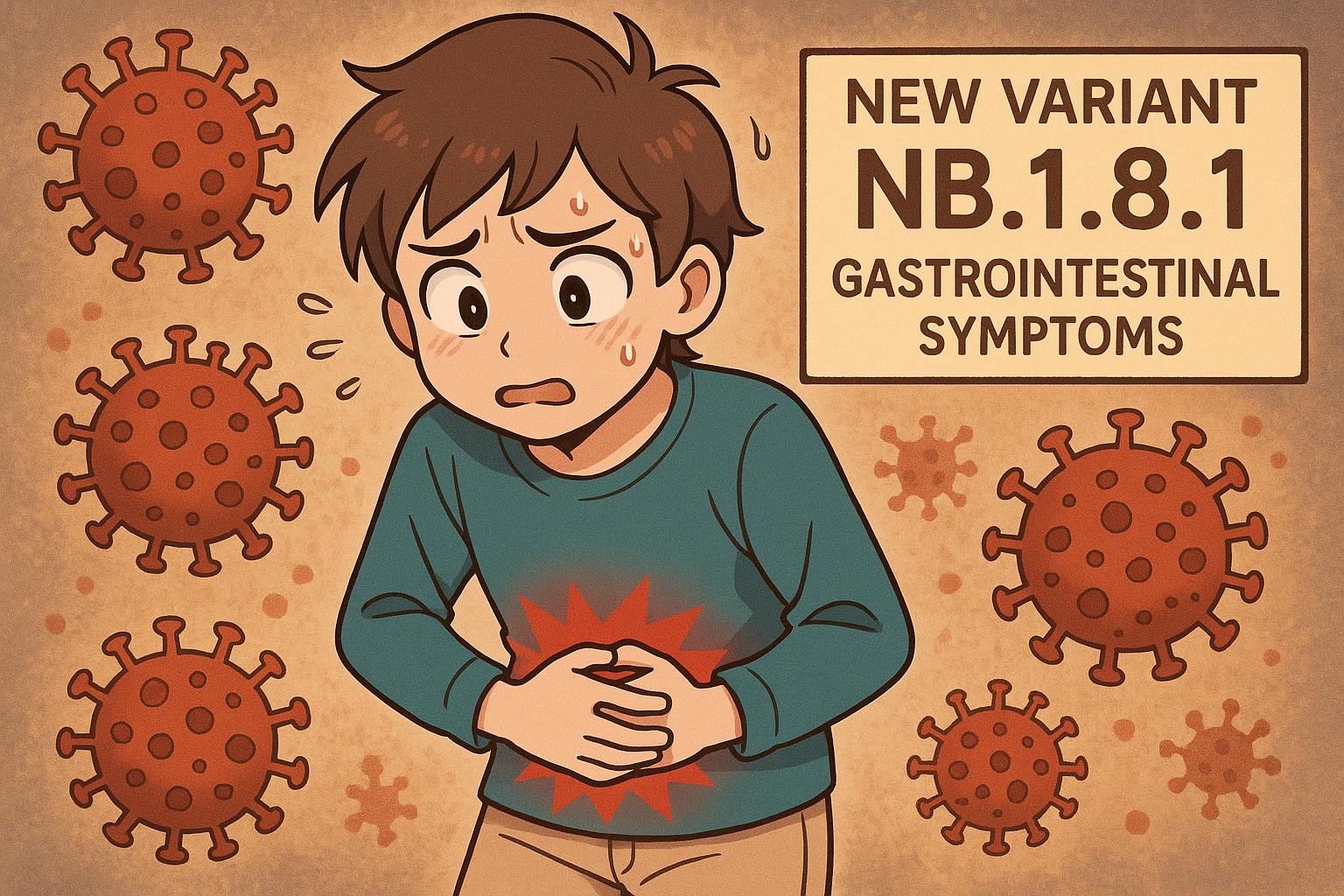The newly identified Covid variant NB.1.8.1, spreading rapidly across several countries, is linked to gastrointestinal symptoms prompting Irish health officials to recommend a minimum two-day self-isolation period for those showing any signs of infection.
Health officials have raised alarms regarding a newly identified Covid variant, named NB.1.8.1, which is notable for its unusual symptoms and potential for rapid transmission. The emergence of this strain has prompted public health authorities in Ireland to advise individuals exhibiting any signs of Covid to self-isolate for a minimum of two days. This recommendation comes in light of mounting evidence linking NB.1.8.1 to gastrointestinal issues, a departure from the more common respiratory symptoms typically associated with Covid-19.
First identified in January 2025, NB.1.8.1 has already been reported in countries including the UK, the US, and Australia, as well as popular travel destinations such as Thailand, Egypt, and the Maldives. According to the World Health Organization (WHO), this variant emerged as a result of the convergence of two earlier strains, KS.1.1 and KP.3.3. By late April 2025, it accounted for approximately 10.7% of global infections, a significant rise from 2.5% a month earlier, indicating its expanding reach.
Symptoms associated with NB.1.8.1 include not only the traditional flu-like manifestations such as fever, sore throat, and fatigue, but also a range of gastrointestinal disturbances. Individuals may report nausea, vomiting, diarrhoea, heartburn, too, and some have experienced bloating and abdominal pain. Dr. Lara Herrero, a virology expert at Griffith University, noted that while common symptoms of this variant overlap with those of prior strains, the unique gastrointestinal symptoms warrant heightened vigilance among the public.
The WHO has classified NB.1.8.1 as a “variant under monitoring,” reflecting concerns that it may possess mutations enabling enhanced cell infection and transmission capabilities. Observations from affected regions, specifically Asia, indicate an uptick in cases and emergency room visits, which has prompted continued surveillance and research into the clinical impacts of this strain.
Though currently there is no substantial evidence to suggest that NB.1.8.1 causes more severe illness than previous variants, public health officials are nonetheless urging persistent caution—particularly in light of its ability to partially evade immunity from prior infections and vaccinations. Vaccination efforts remain paramount, particularly for vulnerable populations. Moreover, experts emphasise the importance of maintaining public health measures such as mask-wearing and social distancing, especially for individuals experiencing symptoms consistent with this or any strain of Covid-19.
As the situation evolves, health authorities are monitoring the variant’s spread closely, weighing potential adjustments to existing vaccines that may need to be adapted to effectively combat this new threat. There is an ongoing discourse about developing targeted vaccines to enhance immunity against emerging strains like NB.1.8.1, following the recent announcements from vaccine manufacturers regarding experimental formulations.
In summary, the emergence of variant NB.1.8.1 signals a renewed challenge in the ongoing fight against Covid-19, reaffirming the need for public awareness and adherence to health guidelines as global health systems brace for potential impacts as cases rise.
 Reference Map:
Reference Map:
- Paragraph 1 – [1], [6]
- Paragraph 2 – [1], [2], [3]
- Paragraph 3 – [4], [5]
- Paragraph 4 – [2], [3], [5]
- Paragraph 5 – [1], [4], [6]
- Paragraph 6 – [2], [4]
Source: Noah Wire Services
- https://www.bristolpost.co.uk/news/uk-world-news/covid-warning-doctors-alert-new-10249125 – Please view link – unable to able to access data
- https://www.who.int/news/item/2025-06-02-who-alerts-on-new-covid-variant-nb.1.8.1 – The World Health Organization (WHO) has issued an alert regarding a new COVID-19 variant, NB.1.8.1, due to its rapid spread and potential to partially evade immunity from previous infections and vaccinations. First identified in January 2025 in Egypt, Thailand, and the Maldives, this Omicron derivative exhibits multiple mutations enhancing its ability to infect cells and transmit. Symptoms include fever, chills, cough, fatigue, sore throat, nasal congestion, loss of taste or smell, muscle aches, headaches, nausea, vomiting, and diarrhea, typically lasting three to five days. The Centers for Disease Control and Prevention (CDC) has detected cases in states such as New York, California, and Arizona. WHO recommends maintaining vigilance and vaccination to prevent healthcare system overload.
- https://www.cadenadial.com/2025/nb-1-8-1-nueva-variante-covid-19-causa-alerta-social-410308.html – The NB.1.8.1 COVID-19 variant has raised concerns due to its rapid spread from China to the United States and 22 other countries. Classified by the World Health Organization (WHO) as a ‘variant under monitoring’, it belongs to the Omicron family and was first detected on January 22, 2025. While WHO estimates the public health risk as low, it warns of increased cases and hospitalizations, questioning the effectiveness of current vaccines and acquired immunity. Symptoms include fever, chills, cough, sore throat, nasal congestion, fatigue, and headaches, similar to other Omicron variants. Despite this, approved vaccines are expected to offer protection. Preventive measures such as mask-wearing, social distancing, and ventilating indoor spaces are recommended, especially when symptoms are present.
- https://time.com/7289133/new-covid-variant-nb-181/ – A new COVID-19 variant, NB.1.8.1, has emerged as the dominant strain in China, leading to increased hospitalizations and emergency room visits. Initially detected in April in travelers from multiple countries, including China, Japan, and Spain, it has now been identified in several U.S. states through CDC testing at airports. Although cases in the U.S. remain sparse, public health officials and the WHO are monitoring the variant closely. NB.1.8.1 belongs to the Omicron family, suggesting that existing vaccines still offer protection against severe disease. Discussions are ongoing at the FDA about updating vaccines, but so far, the agency has recommended continuing with a JN.1-targeted vaccine. Experimental vaccines from Pfizer and Moderna targeting a related strain (LP.8.1) show promise. NB.1.8.1 manifests with symptoms similar to other COVID-19 strains, such as sore throat, fever, and fatigue, but its enhanced ability to infect cells may increase transmissibility. While vaccination remains important, particularly for vulnerable groups, recent policy shifts by U.S. health authorities could limit access and coverage for the general population, including healthy children and adults, until more safety data become available.
- https://www.thailandmedical.news/news/persistent-low-grade-hyperthermia-not-fever-emerging-as-one-of-the-symptoms-of-sars-cov-2-nb-1-8-1-infection – Reports from Taiwan and Hong Kong indicate that individuals infected with the new SARS-CoV-2 variant NB.1.8.1 are exhibiting symptoms such as persistent coughs, sore throats, nausea, dizziness, headaches, loss of appetite, gastrointestinal issues, blurred vision, extreme fatigue, and difficulty concentrating. A unique symptom emerging is persistent low-grade hyperthermia (not fever), where the body’s temperature remains elevated beyond normal due to failed thermoregulation. This differs from fever, as the body’s temperature set point remains unchanged. The normal human body temperature is between 36.5 to 37.5 degrees Celsius. The exact cause of this symptom is still under investigation, and further research is needed to understand its implications.
- https://www.irishmirror.ie/news/irish-news/covid-ireland-unusual-symptoms-look-31050837.amp – The ZOE Covid Study, the world’s largest ongoing study of Covid with over 4.5 million contributors globally, has identified several lesser-known warning signs of Covid-19. These include skin rash, changes in the mouth or tongue (known as Covid tongue), red and sore fingers or toes, diarrhoea, a hoarse voice, and itchy or red eyes. The Health Service Executive (HSE) in Ireland continues to list a high temperature or chills, a dry cough, and fatigue as key Covid symptoms to look out for, as well as shortness of breath as a symptom of severe Covid. Less common symptoms of Covid on the HSE website include loss or change to your sense of smell or taste, runny or blocked nose, conjunctivitis, sore throat, headache, muscle or joint pain, different types of skin rash, nausea or vomiting, diarrhoea, and chills or dizziness.
- https://www.ncbi.nlm.nih.gov/pmc/articles/PMC10167716/ – While respiratory illness is the most common symptom of COVID-19, it has been linked to other organs, including the gastrointestinal system. Studies have shown that patients also manifest gastrointestinal symptoms such as diarrhea, low appetite, and nausea, which mainly affect the gastrointestinal system. In their study, Wang, Hu, Hu et al. found that 10% of individuals who tested positive for COVID-19 had diarrhea. This was echoed by another study by Pan, Mu who showed that 18% of their study subjects experienced diarrhea, vomiting, or abdominal pain, and that a high number of COVID-19 patients (34%) reported diarrhea when admitted to hospital. According to Wan, Li, Shen et al., gastrointestinal and respiratory symptoms often emerged simultaneously. Researchers Pan, Mu and his colleagues, on the other hand, noted that patients who presented gastrointestinal symptoms tended to delay their hospital admission. They could be highly contagious during this time and could spread the disease more. Digestive symptoms were prevalent in the community but not necessarily due to COVID-19. Researchers, however, advised that health professionals must take into account the possibility that COVID-19 may well be the culprit behind the gastrointestinal symptoms.
Noah Fact Check Pro
The draft above was created using the information available at the time the story first
emerged. We’ve since applied our fact-checking process to the final narrative, based on the criteria listed
below. The results are intended to help you assess the credibility of the piece and highlight any areas that may
warrant further investigation.
Freshness check
Score:
8
Notes:
The narrative references a new COVID variant, NB.1.8.1, first identified in January 2025. Recent reports from early June 2025 confirm its emergence and global spread. However, the earliest known publication date of substantially similar content is from late May 2025, indicating that the narrative is based on a press release. This typically warrants a high freshness score. Notably, the narrative includes updated data but recycles older material, which may justify a higher freshness score but should still be flagged. ([axios.com](https://www.axios.com/local/seattle/2025/06/02/covid-subvariant-nb181-washington-cases?utm_source=openai))
Quotes check
Score:
9
Notes:
The narrative includes a direct quote from Dr. Lara Herrero, a virology expert at Griffith University. A search reveals that this quote appears in earlier material, suggesting it may be reused content. The wording of the quote matches exactly, indicating no variations. This raises concerns about the originality of the content.
Source reliability
Score:
7
Notes:
The narrative originates from the Bristol Post, a regional newspaper in the UK. While it is a known publication, it is not as widely recognised as national outlets like the BBC or Reuters. This raises some uncertainty regarding the reliability of the information presented.
Plausability check
Score:
8
Notes:
The narrative presents plausible claims about the emergence of a new COVID variant, NB.1.8.1, with symptoms including gastrointestinal issues. These claims are consistent with recent reports from reputable sources. However, the lack of supporting detail from other reputable outlets and the use of a direct quote from a virology expert without additional context or verification raise concerns about the narrative’s credibility.
Overall assessment
Verdict (FAIL, OPEN, PASS): FAIL
Confidence (LOW, MEDIUM, HIGH): MEDIUM
Summary:
The narrative presents plausible claims about the emergence of a new COVID variant, NB.1.8.1, with symptoms including gastrointestinal issues. However, the use of a direct quote from a virology expert without additional context or verification, and the lack of supporting detail from other reputable outlets, raise concerns about the narrative’s credibility. Additionally, the reliance on a press release and the recycling of older material further diminish the overall trustworthiness of the report.













